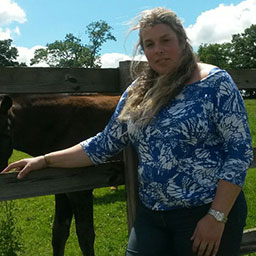
Role
Course Leader and Lecturer, Equine Science degree, Abingdon and Witney College.
My passion has always been horses – but it wasn’t until later in my life that I made them the focus of my career. Now I’m teaching and researching their behaviour - as well as many other aspects of equine science – and it is the best job in the world. I have the BSc Equine Science degree under my care. From the beginning of my academic career I have been involved with Equitation Science, still a new area of research, which makes it very exciting. As well as my own research I am also supporting students in their research activities. I’ve encouraged them to attend the International Society for Equine Science (ISES) annual conference and to date two of them have had their work accepted by the Society and have travelled to France to present their abstracts at the latest Conference. I also work collaboratively with other members of ISES– and the impact of the Society on changes in equine legislation has had an effect around the world, with groups such as the British Horse Society and the RSPCA endorsing research carried out by ISES.
Research
My own research currently focuses on two areas - road safety for riders and their mounts and the impact of bitless bridles on horse behaviour and welfare. My students have conducted behavioural studies of horses’ responses to visual and audio stimuli and also the most effective ways to introduce and familiarise a horse to unusual objects, along with much research into the racing world, looking at attendance at racecourses and reproductive issues of Thoroughbreds.
My recent road safety research since 2013 include the significance of black and white used on a rider’s tabard instead of the traditional ‘high vis’ ones. No previous research exists on this topic and I’ve had an article published on the findings in ‘Horse and Hound’ – the trade magazine. I have taken out a patent on the idea and am hoping to manufacture an actual product.
Combined with the fact that our EQS and EQT courses have, to date, seen one hundred percent of its students find employment in the industry, equine science is a really rewarding area to be involved in. I am open and happy to talk about the fact that I have Asperger’s syndrome, especially to reassure others with learning disabilities that it doesn’t mean it’ll hold you back - I’ve not let it prevent me having a successful career.
